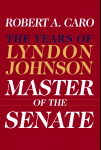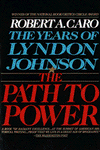Book Three of Robert A. Caro’s monumental work, The Years of
Lyndon Johnson—the most admired and riveting political
biography of our era—which began with the best-selling and
prizewinning The Path to Power and Means of
Ascent.
Master of the Senate carries Lyndon
Johnson’s story through one of its most remarkable periods: his
twelve years, from 1949 to 1960, in the United States Senate. At the
heart of the book is its unprecedented revelation of how legislative
power works in America, how the Senate works, and how Johnson, in his
ascent to the presidency, mastered the Senate as no political leader
before him had ever done.
It was during these years that all
Johnson’s experience—from his Texas Hill Country boyhood to
his passionate representation in Congress of his hardscrabble
constituents to his tireless construction of a political
machine—came to fruition. Caro introduces the story with a
dramatic account of the Senate itself: how Daniel Webster, Henry Clay,
and John C. Calhoun had made it the center of governmental energy, the
forum in which the great issues of the country were thrashed out. And
how, by the time Johnson arrived, it had dwindled into a body that
merely responded to executive initiatives, all but impervious to the
forces of change. Caro anatomizes the genius for political strategy and
tactics by which, in an institution that had made the seniority system
all-powerful for a century and more, Johnson became Majority Leader
after only a single term—the youngest and greatest Senate Leader
in our history; how he manipulated the Senate’s hallowed rules and
customs and the weaknesses and strengths of his colleagues to change the
“unchangeable” Senate from a loose confederation of
sovereign senators to a whirring legislative machine under his own
iron-fisted control.
Caro demonstrates how Johnson’s
political genius enabled him to reconcile the unreconcilable: to retain
the support of the southerners who controlled the Senate while earning
the trust—or at least the cooperation—of the liberals, led
by Paul Douglas and Hubert Humphrey, without whom he could not achieve
his goal of winning the presidency. He shows the dark side of
Johnson’s ambition: how he proved his loyalty to the great oil
barons who had financed his rise to power by ruthlessly destroying the
career of the New Dealer who was in charge of regulating them, Federal
Power Commission Chairman Leland Olds. And we watch him achieve the
impossible: convincing southerners that although he was firmly in their
camp as the anointed successor to their leader, Richard Russell, it was
essential that they allow him to make some progress toward civil rights.
In a breathtaking tour de force, Caro details Johnson’s amazing
triumph in maneuvering to passage the first civil rights legislation
since 1875.
Master of the Senate is told with an abundance
of rich detail that could only have come from Caro’s peerless
research—years immersed in the worlds of Johnson and the United
States Senate, examining thousands of documents and talking to hundreds
of people, from pages and cloakroom clerks to senators and
administrative aides. The result is both a galvanizing portrait of the
man himself—the titan of Capitol Hill, volcanic,
mesmerizing—and a definitive and revelatory study of the workings
of personal and legislative power. It is a work that displays all the
acuteness of understanding and narrative brilliance that led the New
York Times to call Caro’s The Path to Power “a
monumental political saga . . . powerful and stirring.”
"After more than a quarter of a century of research and thought about
Lyndon Johnson, Caro sees the man in full--whirlwind of ego,
exhibitionist, Uriah Heep, hilarious mimic, legislative magician,
idealist, visionary. . . . Caro's immersion in the man and period yields
a fascinating, entertaining abundance. . . . Master of the Senate
splendidly reassembles the U.S. Senate of those years." --Lance Morrow, Time
"To immerse oneself in Robert Caro's heroic biographies is to come face
to face with a shocking but unavoidable realization: Much of what we
think we know about money, power and politics is a fairy tale. . .
Master of the Senate forces us not only to rewrite our national
political history but to rethink it as well." --Eric Alterman, The Nation
"A spectacular piece of historical biography, delicious reading for both
political junkies and serious students of the political process.
. . . Fascinating . . . This long-anticipated third volume is worth the wait." --Robert D. Novak, The Weekly Standard
"After The Path to Power and Means of Ascent, there shouldn't be much
debate about Caro's grand achievement, but let's be clear about this
nonetheless: In terms of political biography, not only does it not get
better than this, it can't." --Patrick Beach, Austin American-Statesman
"Caro writes history with [a] novelist's sensitivity. . . . No historian
offers a more vivid sense not only of what happened, but what it looked
like and felt like. . . . A most revealing book." --Bob Minzesheimer, USA Today
"Masterful . . . . A work of genius." --Steve Weinberg, New Orleans Times-Picayune
"It will be hard to equal this amazing book. . . . A wonderful, a
glorious tale. . . . Johnson made the impossible happen. Caro's description of how he did it [passed the
civil rights legislation] is masterly; I was there and followed the
course of the legislation closely, but I did not know the half of it." --Anthony Lewis, New York Times Book Review
"In this fascinating book, Robert Caro does more than carry forward his
epic life of Lyndon Johnson. With compelling narrative power and with
remarkable subtlety and sensitivity, he illuminates the Senate of the
United States and its byzantine power struggles. In this historical
tour-de-force, Robert Caro shows himself the true 'master of the
Senate.'" --Arthur Schlesinger, Jr.
"Probably the best book ever written about the U.S. Senate. A terrific study of power politics." --Steve Neal, Chicago Sun-Times
"Does it live up to the profound success of the earlier volumes? The
answer is a resounding yes. . . . The biography of the season." --Brad Hooper, Booklist
"Master of the Senate is vintage Caro--a portrait so deft, vivid, and
compelling that you practically feel LBJ gripping your arm and bending
you to his will." --Jean Strouse
"Breathtaking to read, like spending a week curled up with a magnificent
political novel. . . . here we get a giant, a colossus who bestrode the
U.S. Senate from 1949 until 1961. Caro tells this story as it has never
been told before. We see Johnson revealed . . . overpowering everyone
around him with the irresistible Johnson treatment." --Christopher Lehmann-Haupt, Modern Maturity
"Mesmerizing . . . The historian's equivalent of a Mahler symphony--vast,
detailed and striving for the universal . . . Without ever straying from the
mountain of facts he's amassed, Caro delivers a tale rife with drama and
hypnotic in the telling . . . [It] brings Lyndon blazing into the Senate." --Malcolm Jones, Newsweek
"The most complete portrait of the Senate ever drawn. The work, told
within the framework of the life of Lyndon Johnson, is really an epic
history of the twentieth century." --Michael Wolff, New York
"Mr. Caro drives the story forward
irresistibly and makes the arcane almost graphic...If Mr Caro's work on
Johnson has not already set a new standard in American political
biography, it surely will when his story of Johnson's presidency is
complete." --The Economist
"In this magnificent work, Robert Caro has given us the grand and
absorbing saga of Lyndon Johnson, the U.S. Senate, and the Democratic
Party at mid-century. The richly cadenced prose is hypnotic, the
research prodigious, the analysis acute, the mood spellbinding, and the
cast of characters mythic in scale. I cannot conceive of a better book
about Capitol Hill. An unforgettable, epic achievement in the art of
biography." --Ron Chernow
"Uniquely mesmerizing." --Publishers Weekly
"Magisterial . . . A Plutarch (or perhaps Suetonius) for our time:
would that all political biographies were so good." --Kirkus Reviews








